OKINAWA, Japan — Deep in the jungle where venomous snakes outnumber people, survival is not for the faint of heart — it’s a matter of strength, skill, and mental fortitude. For decades, American service members across the globe have attended the Jungle Warfare Training Center (JWTC) in Okinawa, Japan, to hone their survival skills and learn the craft of jungle warfare. But until recently, no woman had ever completed the grueling Leaders Course — until a U.S. Navy Sailor broke the mold.
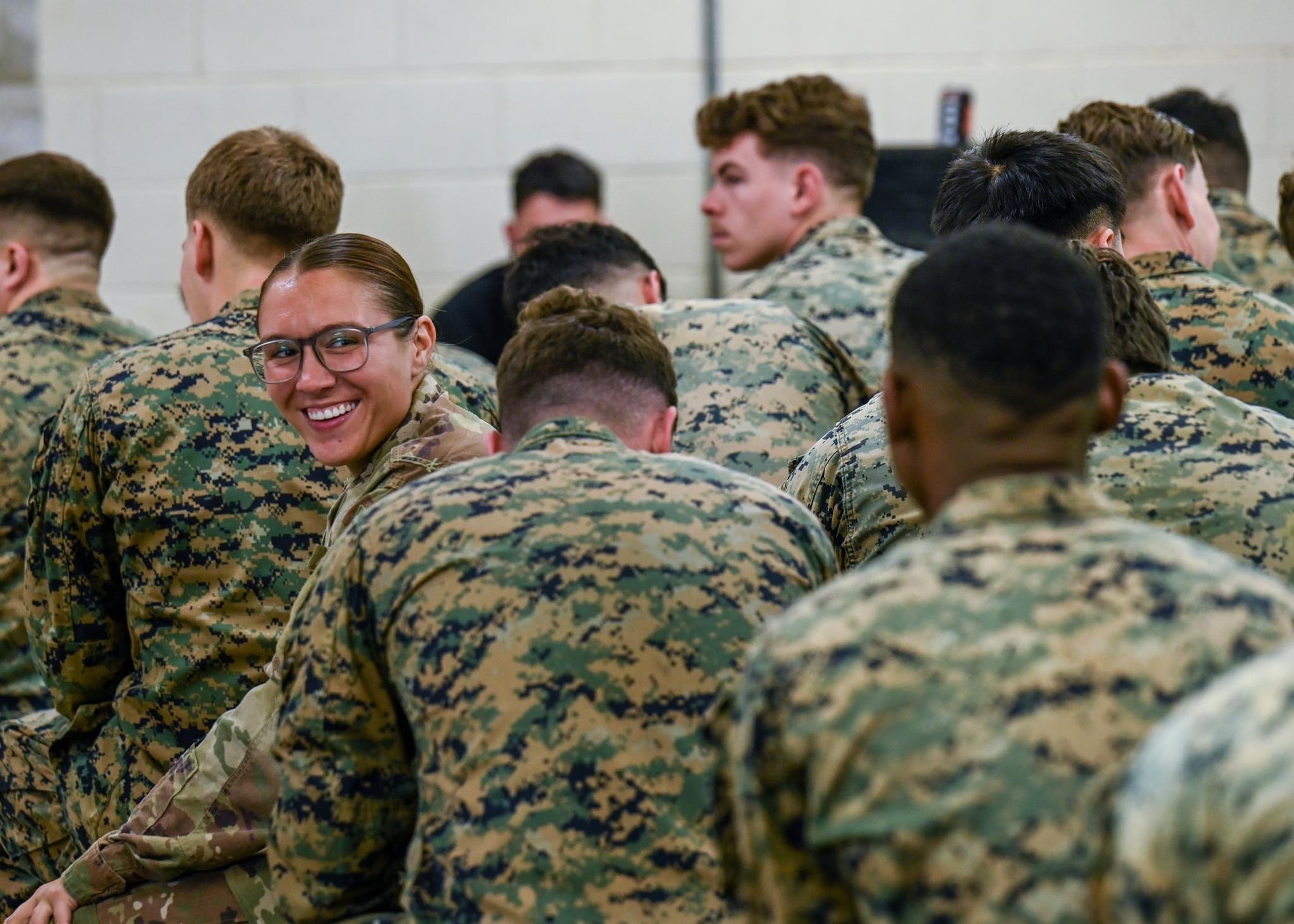
JWTC’s Leaders Course is a rigorous five-week program that tests service members’ physical and mental endurance to the limit. Teams are given minimal supplies and must rely on their training and resiliency to survive. Navigating 8,000 acres of dense, treacherous terrain is just one requirement for participants to demonstrate they can survive in the harsh conditions of the jungle.
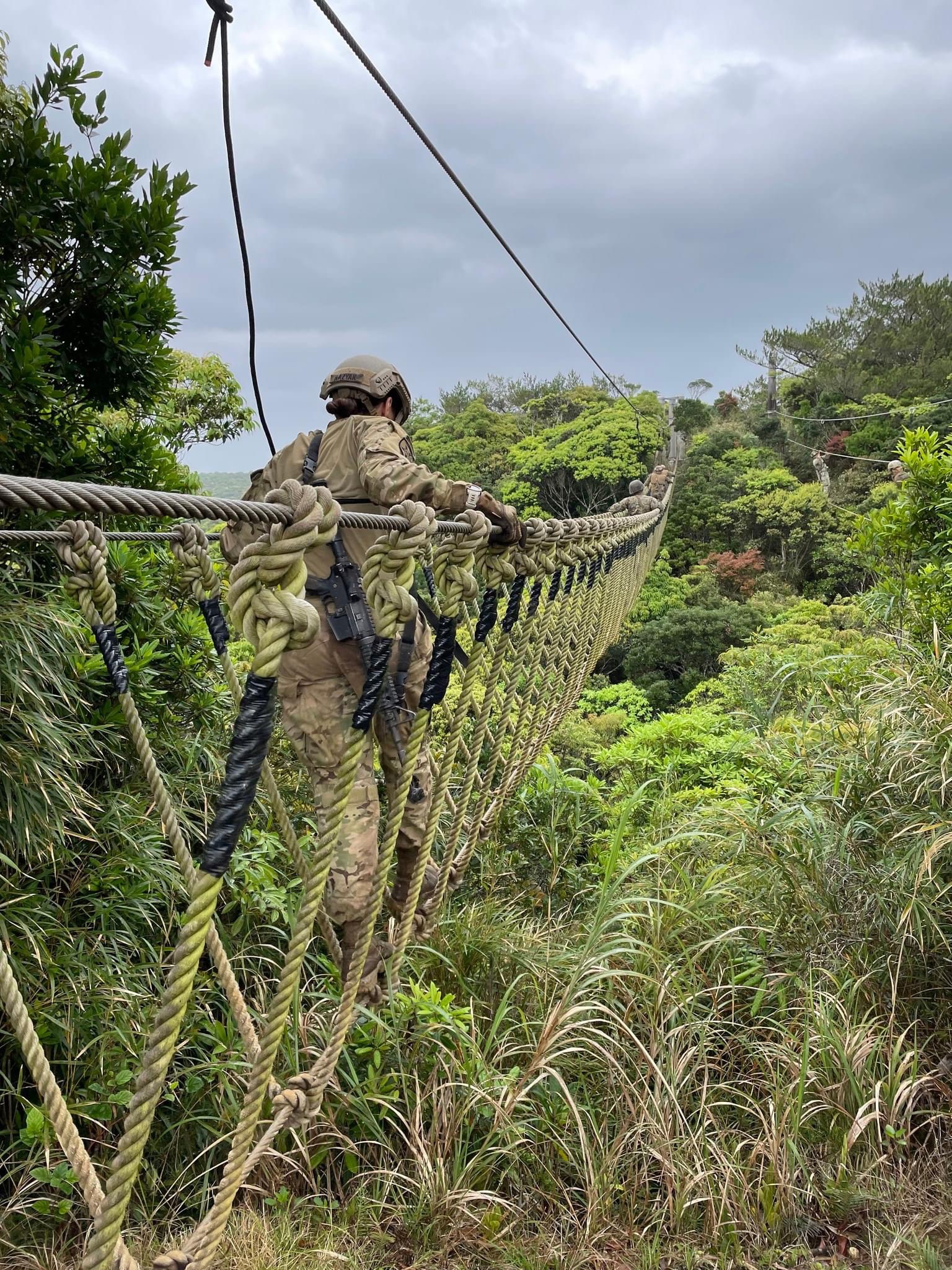
The class endured 455 hours of instruction in a fast-paced, compartmentalized jungle environment where they were taught in a multitude of phases on everything from weapons and rope suspension techniques to combat tactics. Participants received intensive instruction on jungle mobility and Marine scouting and patrolling skills. The capstone was a substantial 120 hours of training on how to survive in the jungle.
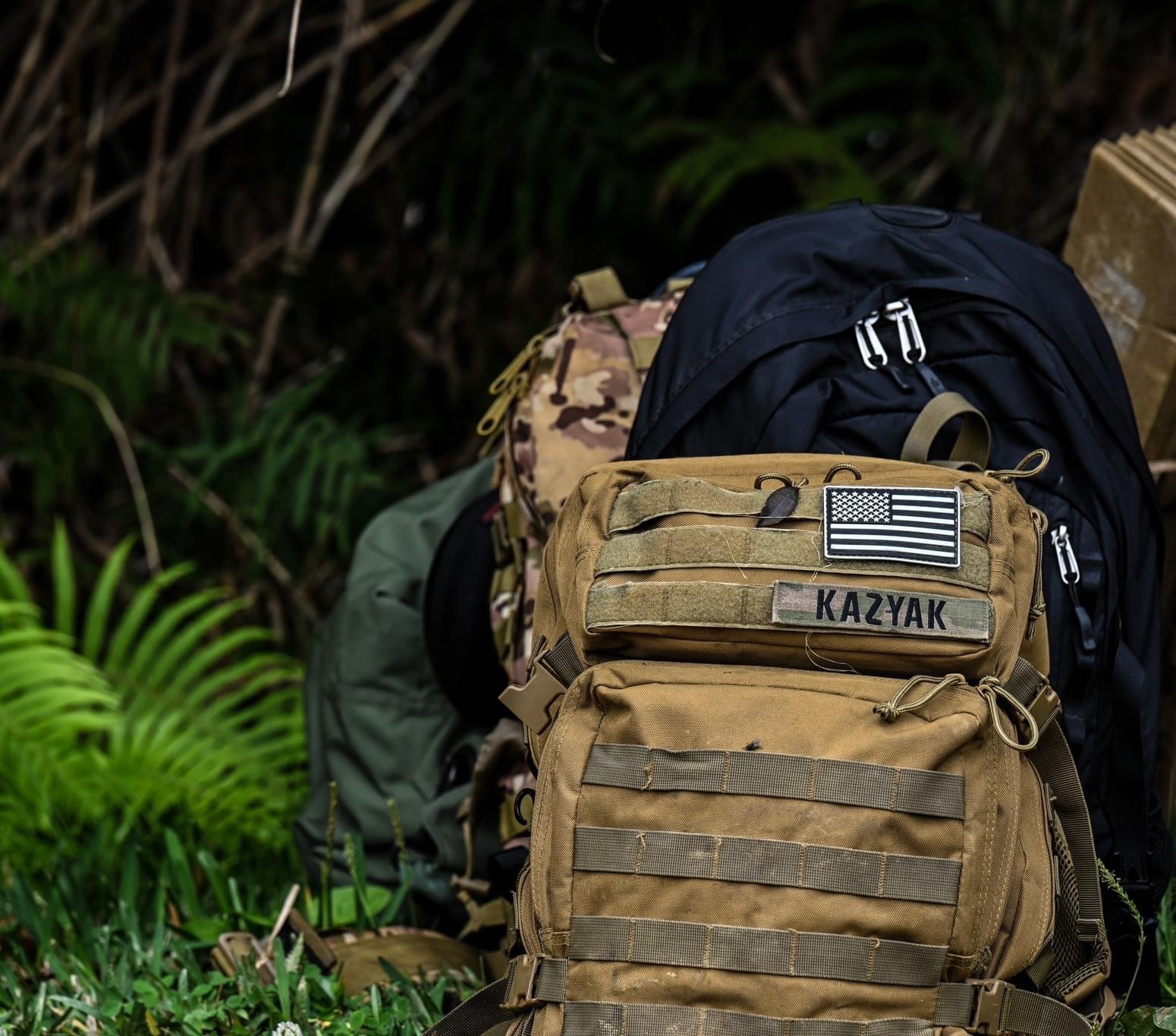
Information Systems Technician 1st Class Nicole Kazyak (pronounced KAY-ZACK) has always gravitated towards challenging opportunities. A 28-year-old native of Midland, Michigan, she graduated from Michigan State University, majoring in Communication with a minor in Public Relations before joining the military in late 2017. After an initial assignment in Hawaii, she transferred to the Joint Communications Support Element (JCSE) at MacDill Air Force Base, Florida, a joint tactical Airborne communications unit prepared to rapidly deploy at a moment’s notice.
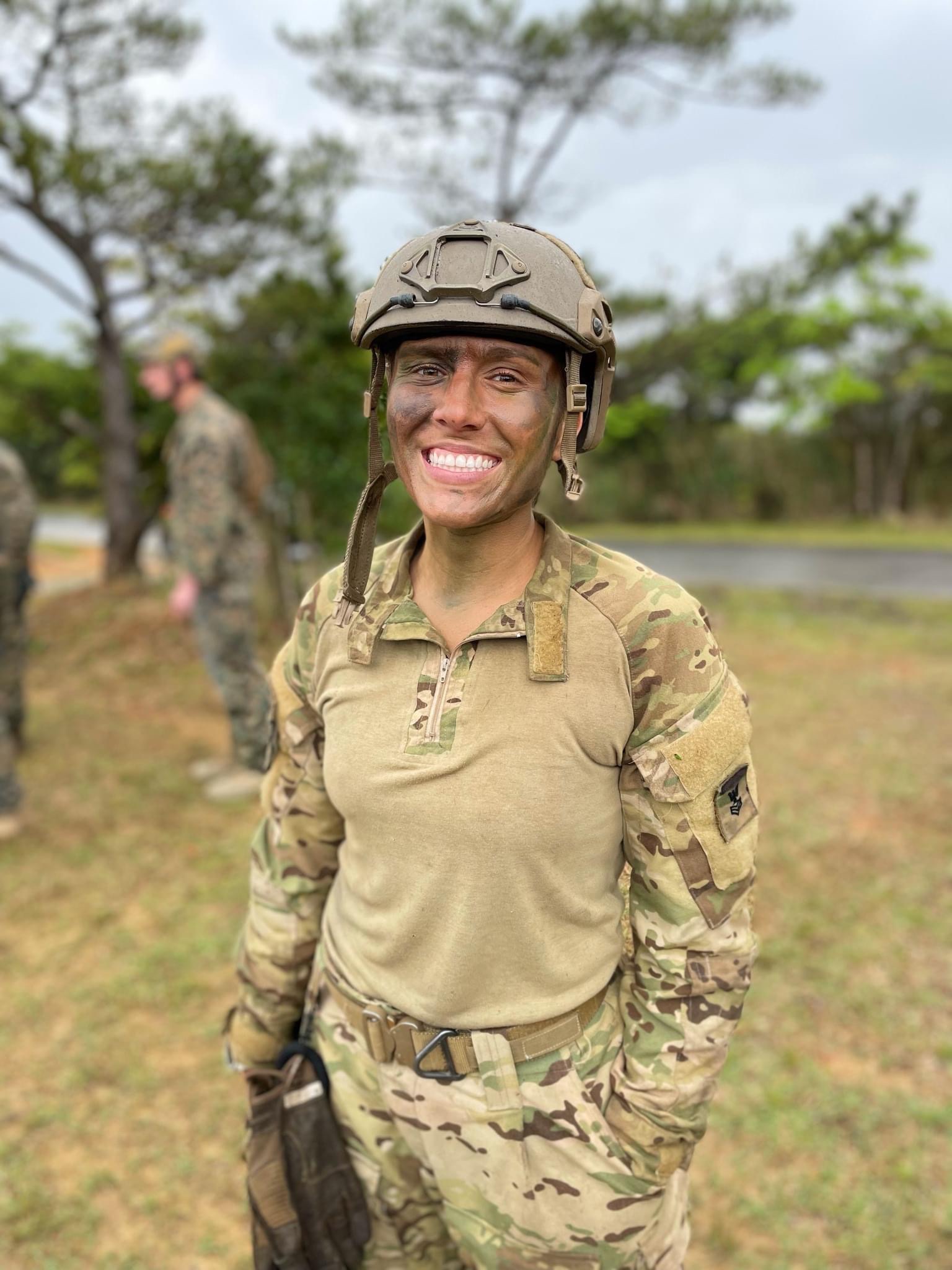
JCSE serves as the “Voice Heard ‘Round the World” and has opened the door to incredible opportunities for Kazyak and others. In 2022, she earned her jump wings from the U.S. Army’s Airborne School, despite a tremendous fear of heights. “Every time I jump, I’m scared. But I feel like that’s not necessarily a bad thing. I feel like once you stop being scared, you should probably stop jumping. Because jumping out of a plane is not a normal thing to do in the first place.”
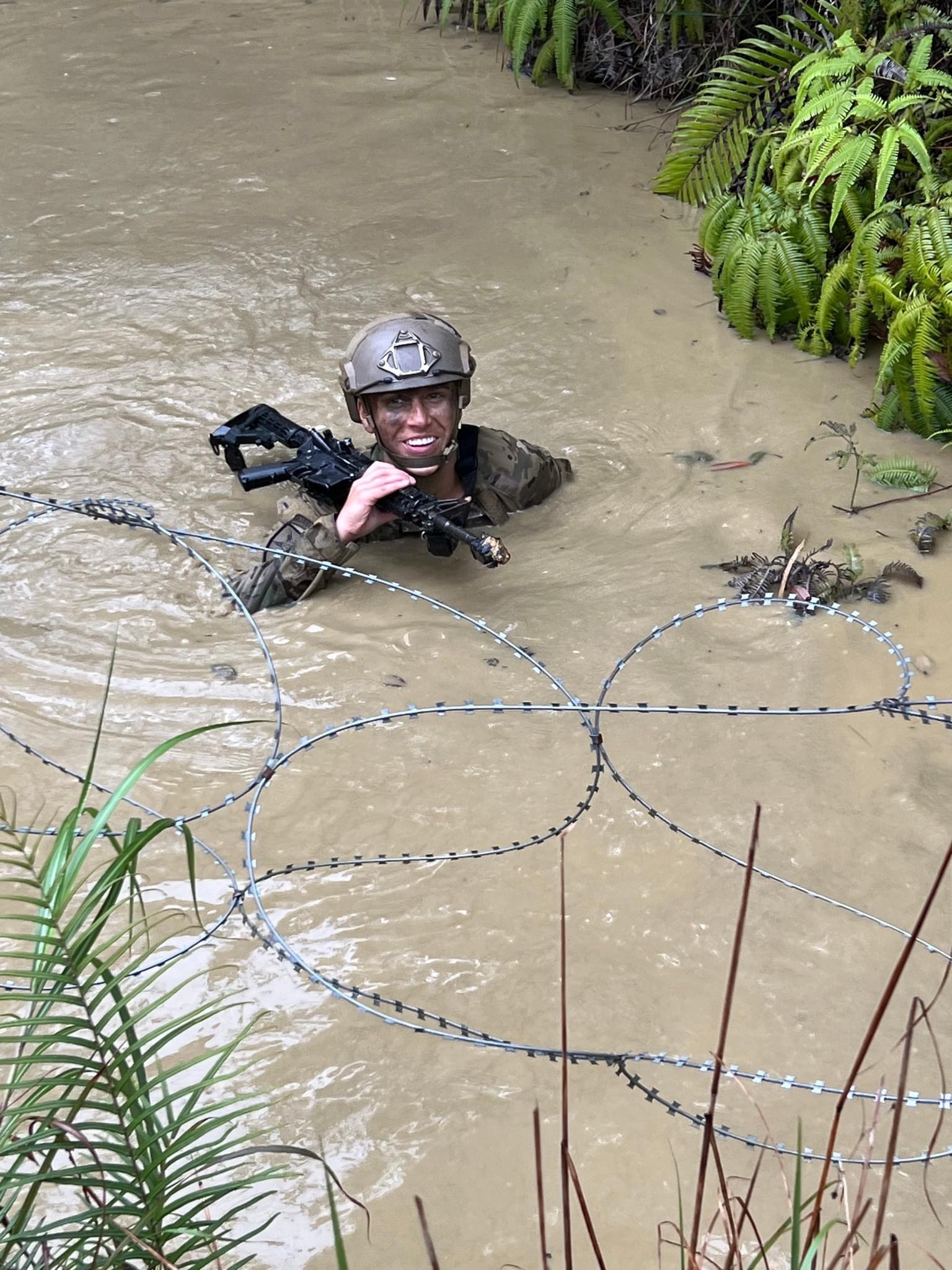
This experience came in handy at JWTC, which featured a rappelling course with a heart-stopping 75’ drop. “I was scared on that, too. But after a couple days of hooking yourself in and rappelling down, after 10-15 times you get a lot more comfortable with it, and it’s not as scary. It becomes a little more fun.”
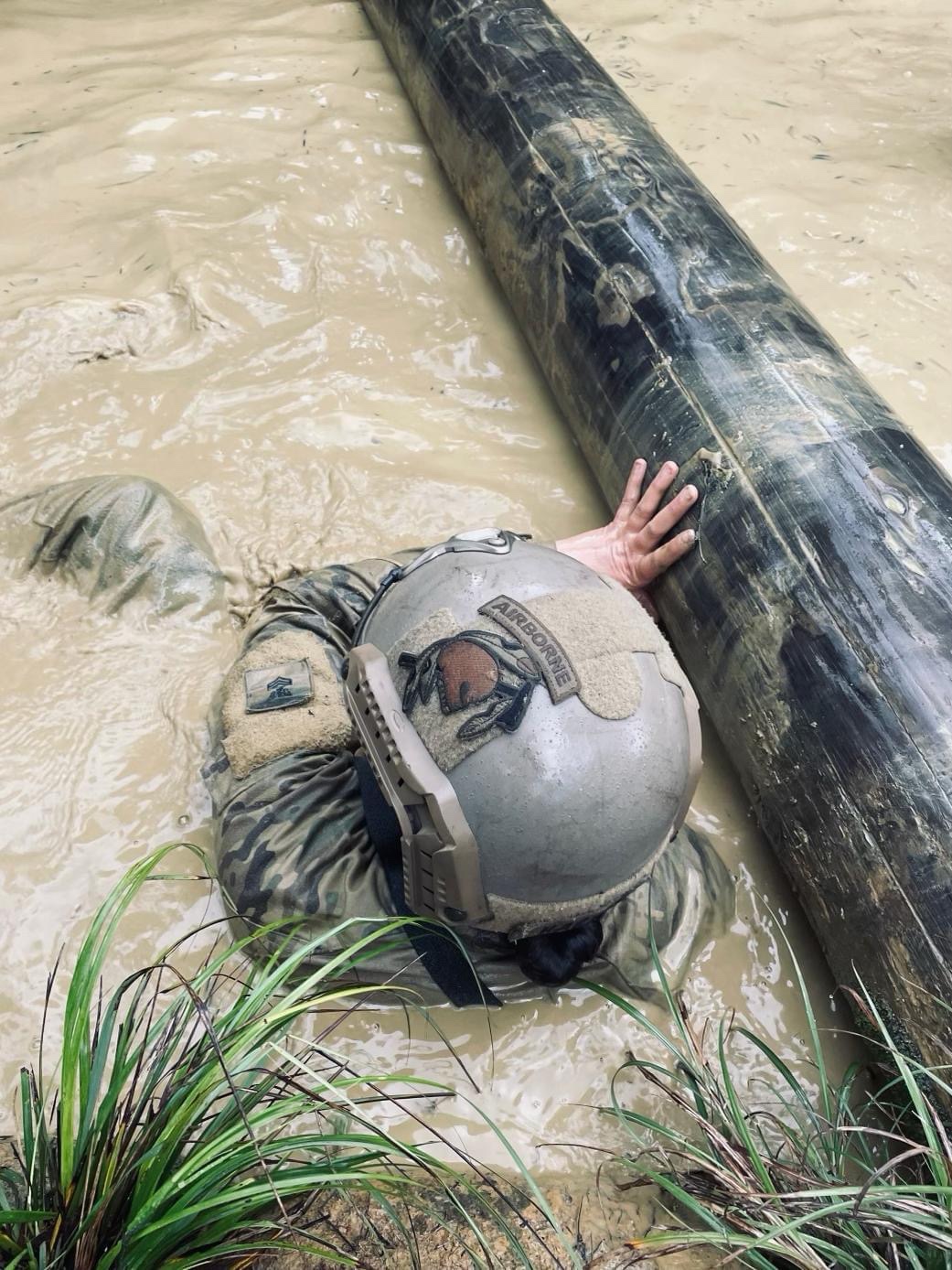
Kazyak survived the training, but not without a major challenge from the outset. “For the first time in my life, I rolled my ankle — and it just happened to be on my first day in the jungle.” She pushed through her injury with the help of on-site medics, ibuprofen, and the support of her teammates. Her desire to complete the training overshadowed the pain of rucking a 30-pound pack, day in and day out. And her discovery that she was the first female to attempt the course motivated her even more.
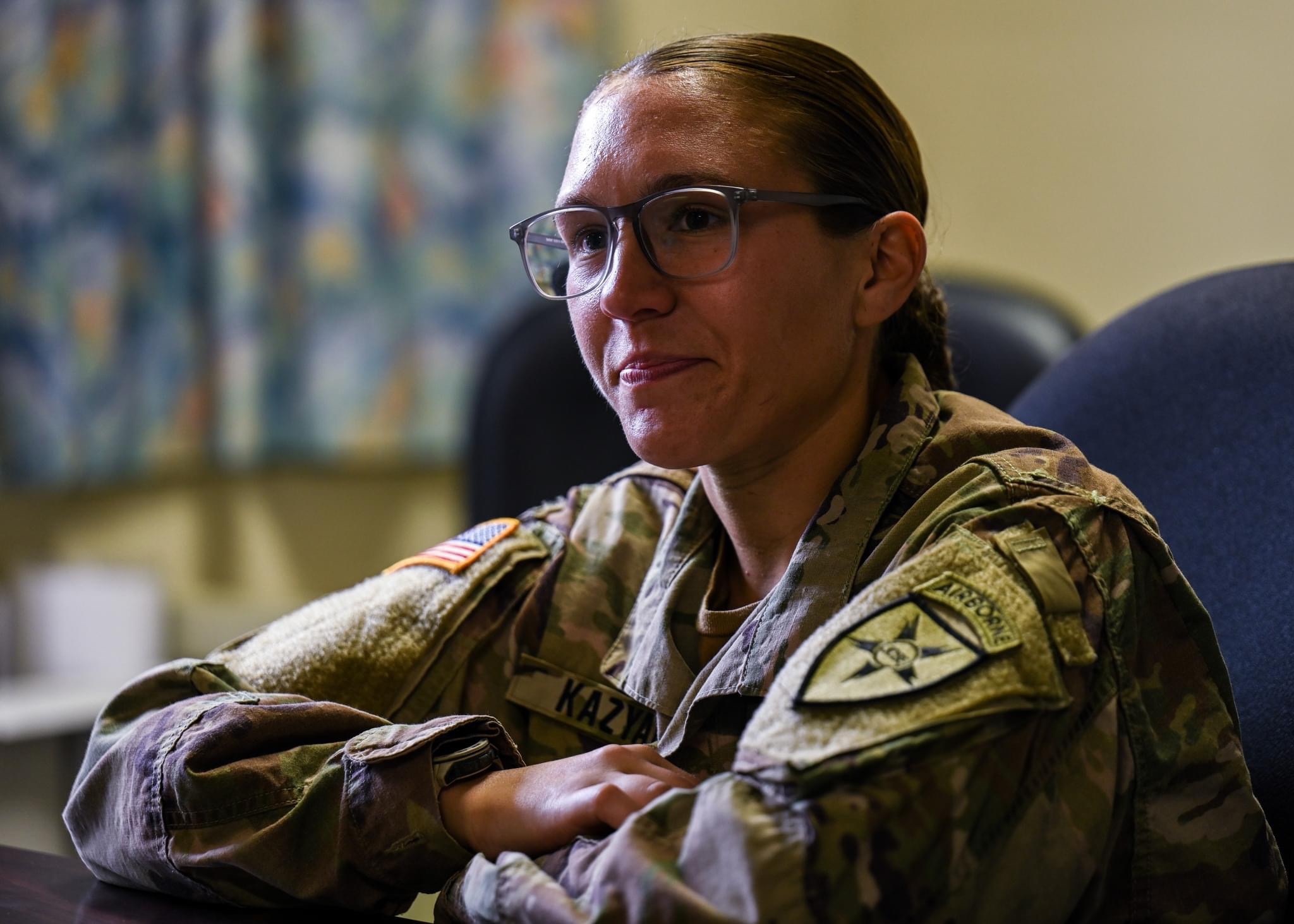
“I didn’t know until after I arrived that I was the first woman to go through the course. There aren’t a lot of females doing infantry, so this was a learning experience for all of us.” Early on, participants embarked on a multi-mile ruck, up and down steep cliffs. “I ended up getting a decent time and keeping up with a lot of the guys. I think after that, we broke the ice. I felt like they could see I really wanted to be there, and I wasn’t going to ask for special treatment,” said Kazyak.
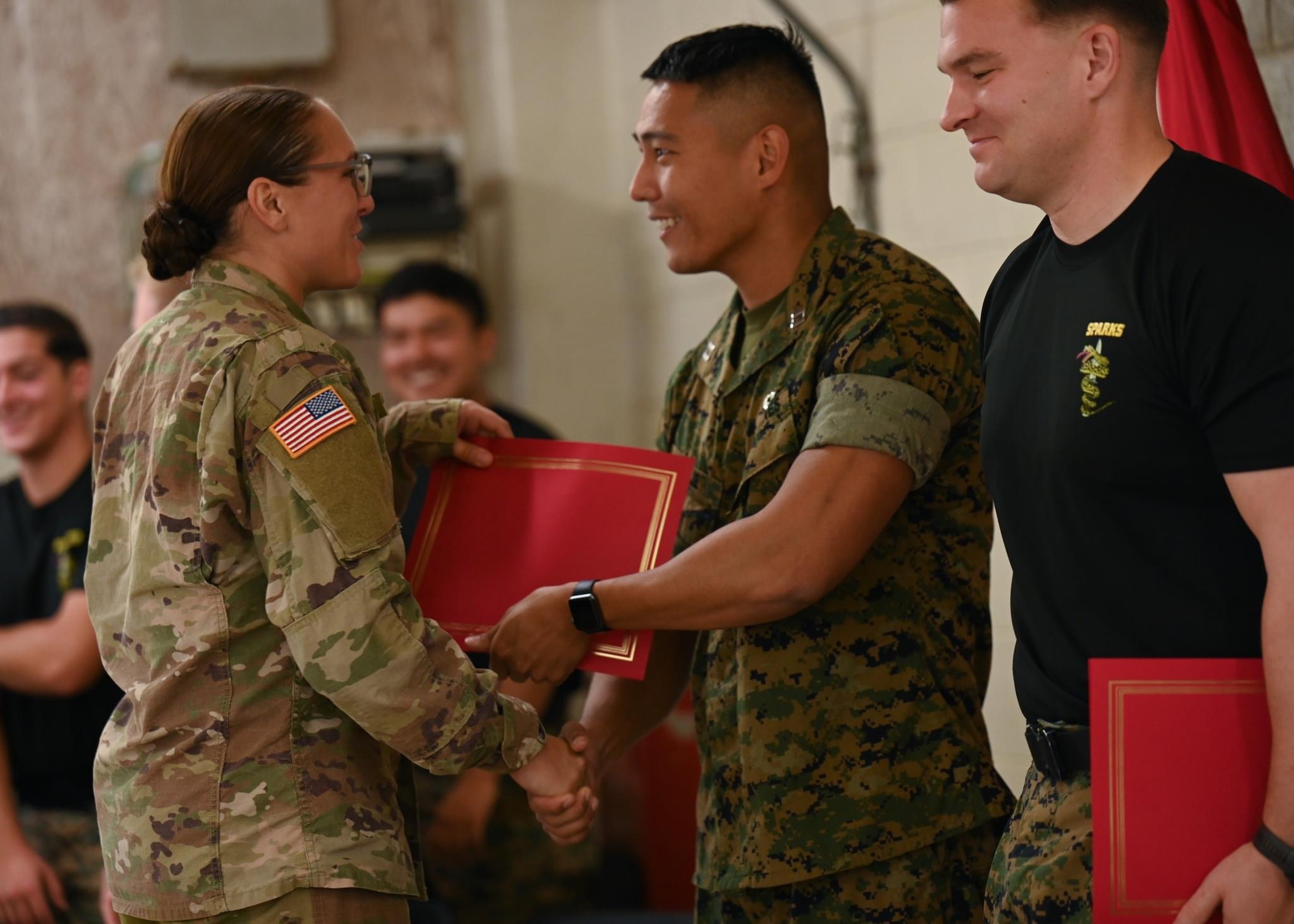
JWTC Commander, Lt. Col. Nathaniel R. Jones, added, “The survival phase these students went through was harder than probably any survival phase I’ve seen in the Leaders Course due to the weather and some of the terrain. The amount of growth that happened with this group was inspiring.”
Describing the team’s time in the jungle as “intense” would be an understatement. For the majority of the course’s survival training, rain and abnormally low temperatures were a constant battle. Okinawan jungles are notoriously hot and humid, so participants were presented with an unexpected hurdle. “I was born in Michigan, but for the past five or six years, I’ve lived in hot climates like Hawaii and Florida. I hate being cold, and I hate being wet. At one point, I was sitting there thinking, ‘I am not going to be able to do this.’ I kept asking myself, ‘Why did you volunteer to be here?’ We were all freezing and absolutely miserable.”
Adding to the unforgiving conditions, the team wasn’t allowed to have light at their campsite for the bulk of their training. It was pitch black at night. “We’d hear the wildest sounds creeping up to our camp. It was so dark you couldn’t see anything. Then you’d hear guys sit up in their bivy sacks, listening. Of course we were all thinking the same thing, ‘What the heck was that?’”
Kazyak was fortunate to avoid the deadly habu snakes, which are more active in the summer, but she encountered the largest spiders of her life. “One guy walked straight into an orb spider’s web. I had heard about the size of spiders on Okinawa, but I didn’t think they would be as big as they were. That spider was massive, the size of my fist.”
That same week, her team’s campsite washed out because of the constant rain. She relied heavily on her teammates. “We realized we had to take it day by day and that we were all in the suck together and had to embrace it. Now that we’re done with it, I realize I can push myself more than I ever thought I could.”
It was thoughts of her mom, dad, and brother that got Kazyak through the tough moments. “Growing up, my mom always told me, ‘Be comfortable being uncomfortable.’ Because once you get comfortable, that means you’re not learning. And you learn the most out of those situations.”
Kazyak’s infantry training was definitely far outside her comfort zone. Nevertheless, her expertise managing the Navy’s global satellite telecommunications systems set her up for success during the comms phase of the jungle warfare training. “I was able to teach these Marines the ins and outs of telecommunications after they had just shown me the ropes of their life in infantry. We all speak in different languages based off our ratings in the military, so this was a cool opportunity to coach one another on our specialties.”
Jungle warfare training is now more crucial than ever, and thanks to this opportunity, she has a greater perspective on the value of the region and the importance of training locally. “At the end of the day, if a conflict does kick off, having a baseline knowledge of this terrain is going to be super beneficial. We’re going back and teaching the troops in our home units. There are so many factors out here: the terrain, the cold, the heat, the location. This is definitely the place to train. It’s just a completely different ballgame for sure.”
Despite the physical and mental challenges, Kazyak and her teammates refused to give up. They ate berries, ferns, and lots of ginger — while staying hydrated by filtering drinking water from ravines. They spent time reminiscing on the comforts of home. “We were all so miserable, but kept pushing through together. I remember at one point, we sat there on the jungle floor, talking about foods we were craving. I couldn’t stop thinking about a place back in Florida that serves pepperoni pizza with hot honey on top. I lost about eight pounds while we were in the jungle, but gained it back once we were finally able to visit the chow hall.”
In reflecting on her time in the jungle, Kazyak was reminded of her mom’s wise advice. “She always tells me, ‘The only thing constant in life is change.’” Kazyak garnered wisdom of her own throughout the course. “You don’t have to be at the peak of everything; you just need to have the motivation and the willingness to actually move forward and complete your goal. I’m not the strongest or the fastest, but I know I can push myself enough to get through those crappy times. I think too many people get complacent and get so used to their day to day and they’re scared of change.”
Kazyak made history on March 31, 2023 — the last day of Women’s History Month — when she became the first female Leaders Course graduate of the U.S. military’s premiere training center on jungle warfare. “This wasn’t a comfortable scenario for me at all. But I feel like those are the situations you learn the most about yourself.”
In an era of change, the U.S. military has come a long way in recognizing and appreciating the contributions of women. Kazyak continues, “I just want to keep pushing and proving women can do anything and everything. I feel like we always have to work 10 times harder to prove ourselves. A lot of people don’t get the opportunities I’ve had, like becoming a jungle leader or going to Airborne School. I like to hold on to that. I’m grateful for it. It shows we can do the same things as the men.”
Story by Candice Barber, Commander, Fleet Activities, Okinawa
Photos by Petty Officer 2nd Class Jessica Hattell


Well done! I look forward to the multi-page news releases sure to come on the first Irish-American graduate, the first Italian-American graduate, the first German-American graduate, the first Polish-American graduate, the first…
This is our society now. Diversity is the end-goal, not the means to an end. The strength part of ‘diversity is our strength’ is automatic, it takes no effort to accomplish other than to do it, just become more diverse and presto…success, even though no one knows what the hell they’re doing once they get there. We’ve become a society that celebrates ‘firsts’ instead of actual accomplishments.
It’s cheap. It’s easy mode. It’s the future.
Ever watch any old movies from the 30s or ’40s? Being Irish or Italian or Polish used to be a lot bigger deal but all those nationalities have integrated into American culture to the point where they are just generic Americans not really noteworthy.
It was very noteworthy and talked about that JFK was the first president who was a Roman Catholic. Now it’s nothing that noteworthy. This is the same, someone’s got to be the first and she’s it.
I thought that every team/unit worked together. When I went thru any school or training. We helped each other out. We had a female in our breathers course. She had trouble with the ram. So one of our senior guys suggested that one guy Carrie’s it. Then the breacher would pull it off the back of someone. Hit the door then drop it.
BZ IT1 Kazyak!
In fairness to Tech 1 Kazyak (hoping I got the rank right), she completed the course. Let’s not lose sight of that. She likely had zero to do with this press release or anything to do with the obvious PR slant.
Good on her.
China don’t care that you gamed the standards to produce a Woke photo op. “I just want to keep pushing and proving women can do anything and everything…. It shows we can do the same things as the men.”
It’s all summer camp until you get good men killed when you find out the hard way some team members can’t hold their own — despite what their little certificates claim.
People who think co-ed combat is OK have never experienced a real war. Put all these Affirmative Action poster children in something like the Chosin Reservoir and you’ll separate the men from the pretenders.
Women will never belong on the front lines and nobody currently serving has the balls to say it and lose their career to the Woke infiltrators.
The Kurds, the Ukrainians, the Soviets, and the North Vietnamese didn’t have any problem putting women into combat. They did quite well too.
Thank you someone had to say it
Sadly, I await for the approaching day – first robot cyborg graduates from.. with recruiting issues, physically weaker service members, costs of post service health care/disability payouts, and debate of who and who shouldn’t serve, we are now have the perfect opportunity for society acceptance of the “rise of the machines”